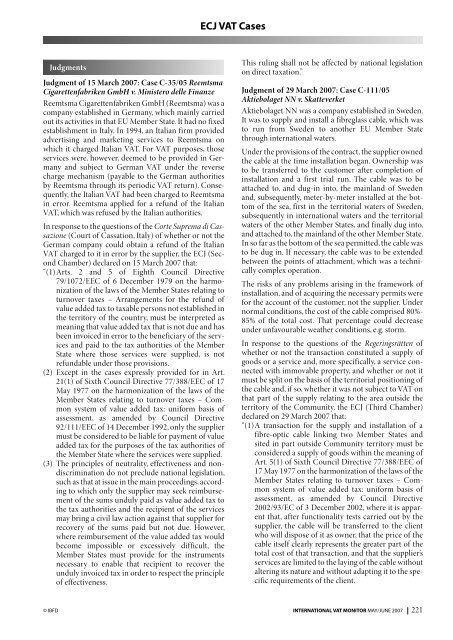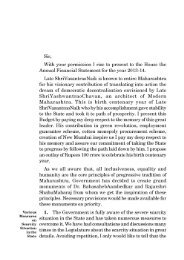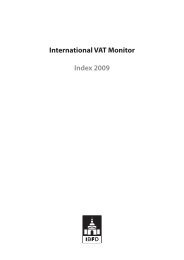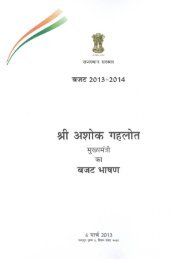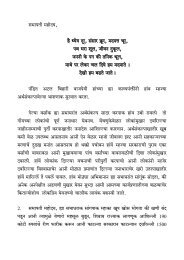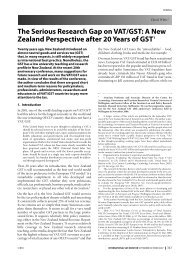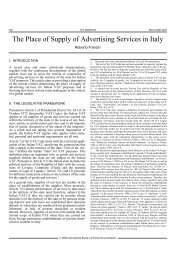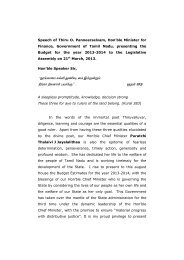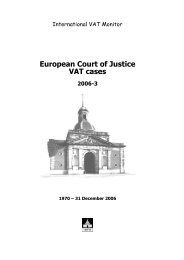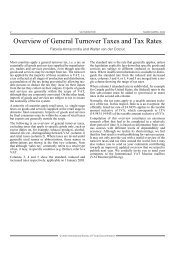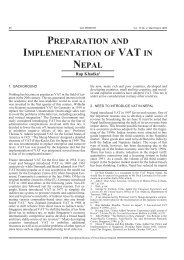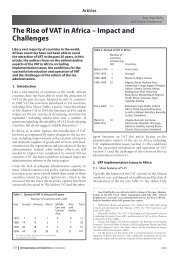ECJ VAT Cases MAY/JUNE 2007 - empcom.gov.in
ECJ VAT Cases MAY/JUNE 2007 - empcom.gov.in
ECJ VAT Cases MAY/JUNE 2007 - empcom.gov.in
You also want an ePaper? Increase the reach of your titles
YUMPU automatically turns print PDFs into web optimized ePapers that Google loves.
Judgments<br />
Judgment of 15 March <strong>2007</strong>: Case C-35/05 Reemtsma<br />
Cigarettenfabriken GmbH v. M<strong>in</strong>istero delle F<strong>in</strong>anze<br />
Reemtsma Cigarettenfabriken GmbH (Reemtsma) was a<br />
company established <strong>in</strong> Germany, which ma<strong>in</strong>ly carried<br />
out its activities <strong>in</strong> that EU Member State. It had no fixed<br />
establishment <strong>in</strong> Italy. In 1994, an Italian firm provided<br />
advertis<strong>in</strong>g and market<strong>in</strong>g services to Reemtsma on<br />
which it charged Italian <strong>VAT</strong>. For <strong>VAT</strong> purposes, those<br />
services were, however, deemed to be provided <strong>in</strong> Germany<br />
and subject to German <strong>VAT</strong> under the reverse<br />
charge mechanism (payable to the German authorities<br />
by Reemtsma through its periodic <strong>VAT</strong> return). Consequently,<br />
the Italian <strong>VAT</strong> had been charged to Reemtsma<br />
<strong>in</strong> error. Reemtsma applied for a refund of the Italian<br />
<strong>VAT</strong>, which was refused by the Italian authorities.<br />
In response to the questions of the Corte Suprema di Cassazione<br />
(Court of Cassation, Italy) of whether or not the<br />
German company could obta<strong>in</strong> a refund of the Italian<br />
<strong>VAT</strong> charged to it <strong>in</strong> error by the supplier, the <strong>ECJ</strong> (Second<br />
Chamber) declared on 15 March <strong>2007</strong> that:<br />
“(1)Arts. 2 and 5 of Eighth Council Directive<br />
79/1072/EEC of 6 December 1979 on the harmonization<br />
of the laws of the Member States relat<strong>in</strong>g to<br />
turnover taxes – Arrangements for the refund of<br />
value added tax to taxable persons not established <strong>in</strong><br />
the territory of the country, must be <strong>in</strong>terpreted as<br />
mean<strong>in</strong>g that value added tax that is not due and has<br />
been <strong>in</strong>voiced <strong>in</strong> error to the beneficiary of the services<br />
and paid to the tax authorities of the Member<br />
State where those services were supplied, is not<br />
refundable under those provisions.<br />
(2) Except <strong>in</strong> the cases expressly provided for <strong>in</strong> Art.<br />
21(1) of Sixth Council Directive 77/388/EEC of 17<br />
May 1977 on the harmonization of the laws of the<br />
Member States relat<strong>in</strong>g to turnover taxes – Common<br />
system of value added tax: uniform basis of<br />
assessment, as amended by Council Directive<br />
92/111/EEC of 14 December 1992, only the supplier<br />
must be considered to be liable for payment of value<br />
added tax for the purposes of the tax authorities of<br />
the Member State where the services were supplied.<br />
(3) The pr<strong>in</strong>ciples of neutrality, effectiveness and nondiscrim<strong>in</strong>ation<br />
do not preclude national legislation,<br />
such as that at issue <strong>in</strong> the ma<strong>in</strong> proceed<strong>in</strong>gs, accord<strong>in</strong>g<br />
to which only the supplier may seek reimbursement<br />
of the sums unduly paid as value added tax to<br />
the tax authorities and the recipient of the services<br />
may br<strong>in</strong>g a civil law action aga<strong>in</strong>st that supplier for<br />
recovery of the sums paid but not due. However,<br />
where reimbursement of the value added tax would<br />
become impossible or excessively difficult, the<br />
Member States must provide for the <strong>in</strong>struments<br />
necessary to enable that recipient to recover the<br />
unduly <strong>in</strong>voiced tax <strong>in</strong> order to respect the pr<strong>in</strong>ciple<br />
of effectiveness.<br />
<strong>ECJ</strong> <strong>VAT</strong> <strong>Cases</strong><br />
This rul<strong>in</strong>g shall not be affected by national legislation<br />
on direct taxation.”<br />
Judgment of 29 March <strong>2007</strong>: Case C-111/05<br />
Aktiebolaget NN v. Skatteverket<br />
Aktiebolaget NN was a company established <strong>in</strong> Sweden.<br />
It was to supply and <strong>in</strong>stall a fibreglass cable, which was<br />
to run from Sweden to another EU Member State<br />
through <strong>in</strong>ternational waters.<br />
Under the provisions of the contract, the supplier owned<br />
the cable at the time <strong>in</strong>stallation began. Ownership was<br />
to be transferred to the customer after completion of<br />
<strong>in</strong>stallation and a first trial run. The cable was to be<br />
attached to, and dug-<strong>in</strong> <strong>in</strong>to, the ma<strong>in</strong>land of Sweden<br />
and, subsequently, meter-by-meter <strong>in</strong>stalled at the bottom<br />
of the sea, first <strong>in</strong> the territorial waters of Sweden,<br />
subsequently <strong>in</strong> <strong>in</strong>ternational waters and the territorial<br />
waters of the other Member States, and f<strong>in</strong>ally dug <strong>in</strong>to,<br />
and attached to, the ma<strong>in</strong>land of the other Member State.<br />
In so far as the bottom of the sea permitted, the cable was<br />
to be dug <strong>in</strong>. If necessary, the cable was to be extended<br />
between the po<strong>in</strong>ts of attachment, which was a technically<br />
complex operation.<br />
The risks of any problems aris<strong>in</strong>g <strong>in</strong> the framework of<br />
<strong>in</strong>stallation, and of acquir<strong>in</strong>g the necessary permits were<br />
for the account of the customer, not the supplier. Under<br />
normal conditions, the cost of the cable comprised 80%-<br />
85% of the total cost. That percentage could decrease<br />
under unfavourable weather conditions, e.g. storm.<br />
In response to the questions of the Reger<strong>in</strong>gsrätten of<br />
whether or not the transaction constituted a supply of<br />
goods or a service and, more specifically, a service connected<br />
with immovable property, and whether or not it<br />
must be split on the basis of the territorial position<strong>in</strong>g of<br />
the cable and, if so, whether it was not subject to <strong>VAT</strong> on<br />
that part of the supply relat<strong>in</strong>g to the area outside the<br />
territory of the Community, the <strong>ECJ</strong> (Third Chamber)<br />
declared on 29 March <strong>2007</strong> that:<br />
“(1)A transaction for the supply and <strong>in</strong>stallation of a<br />
fibre-optic cable l<strong>in</strong>k<strong>in</strong>g two Member States and<br />
sited <strong>in</strong> part outside Community territory must be<br />
considered a supply of goods with<strong>in</strong> the mean<strong>in</strong>g of<br />
Art. 5(1) of Sixth Council Directive 77/388/EEC of<br />
17 May 1977 on the harmonization of the laws of the<br />
Member States relat<strong>in</strong>g to turnover taxes – Common<br />
system of value added tax: uniform basis of<br />
assessment, as amended by Council Directive<br />
2002/93/EC of 3 December 2002, where it is apparent<br />
that, after functionality tests carried out by the<br />
supplier, the cable will be transferred to the client<br />
who will dispose of it as owner, that the price of the<br />
cable itself clearly represents the greater part of the<br />
total cost of that transaction, and that the supplier’s<br />
services are limited to the lay<strong>in</strong>g of the cable without<br />
alter<strong>in</strong>g its nature and without adapt<strong>in</strong>g it to the specific<br />
requirements of the client.<br />
© IBFD INTERNATIONAL <strong>VAT</strong> MONITOR <strong>MAY</strong>/<strong>JUNE</strong> <strong>2007</strong> 221
<strong>ECJ</strong> <strong>VAT</strong> <strong>Cases</strong><br />
(2) Art. 8(1)(a) of Sixth Directive 77/388 must be <strong>in</strong>terpreted<br />
as mean<strong>in</strong>g that the right to tax the supply<br />
and lay<strong>in</strong>g of a fibre-optic cable l<strong>in</strong>k<strong>in</strong>g two Member<br />
States and sited <strong>in</strong> part outside the territory of the<br />
Community is held by each Member State pro rata<br />
accord<strong>in</strong>g to the length of cable <strong>in</strong> its territory with<br />
regard both to the price of the cable itself and the<br />
rest of the materials and to the cost of the services<br />
relat<strong>in</strong>g to the lay<strong>in</strong>g of the cable.<br />
(3) Art. 8(1)(a) of Sixth Directive 77/388, read <strong>in</strong> conjunction<br />
with Arts. 2(1) and 3 of that Directive, must<br />
be <strong>in</strong>terpreted as mean<strong>in</strong>g that the supply and lay<strong>in</strong>g<br />
of a fibre-optic cable l<strong>in</strong>k<strong>in</strong>g two Member States is<br />
not subject to <strong>VAT</strong> for that part of the transaction<br />
which is carried out <strong>in</strong> the exclusive economic zone,<br />
on the cont<strong>in</strong>ental shelf and at sea.”<br />
Judgment of 19 April <strong>2007</strong>: Case C-455/05 Velvet &<br />
Steel Immobilien und Handels GmbH v. F<strong>in</strong>anzamt<br />
Hamburg-Eimsbüttel<br />
In September 1998, Burmeister Immobilien GmbH sold<br />
a plot of land with a rented apartment build<strong>in</strong>g. In July<br />
1999, two <strong>in</strong>dividuals together undertook a similar<br />
transaction. In the two sale contracts, the suppliers<br />
undertook to carry out the renovation work needed on<br />
the build<strong>in</strong>gs concerned. The two <strong>in</strong>dividuals also<br />
assumed a rent guarantee.<br />
After the sales, the suppliers concluded, on 25 September<br />
1998 and 12 July 1999 respectively, contracts with<br />
Velvet & Steel entitled “assignment of a part of the purchase<br />
price <strong>in</strong> return for assumption of obligations”. By<br />
those contracts, Velvet & Steel assumed responsibility<br />
for the suppliers’ obligation to renovate the build<strong>in</strong>gs as<br />
well as for the rent guarantee <strong>in</strong> return for a part of the<br />
purchase price of those build<strong>in</strong>gs. The two purchasers of<br />
the build<strong>in</strong>gs subsequently agreed to release Velvet &<br />
Steel from its obligations <strong>in</strong> return for payment to them<br />
of part of that fraction of the purchase price ceded to it.<br />
The profit result<strong>in</strong>g from that transaction, with regard to<br />
the contracts concluded with Burmeister and with the<br />
two <strong>in</strong>dividuals concerned, rema<strong>in</strong>ed with Velvet & Steel<br />
as “payment or lump-sum compensation/<strong>in</strong>demnity <strong>in</strong><br />
respect of any loss of profit”. Velvet & Steel declared only<br />
that profit as consideration for the services rendered, for<br />
<strong>VAT</strong> purposes.<br />
The tax adm<strong>in</strong>istration took the view that the assumption<br />
by Velvet & Steel of the obligation to renovate the<br />
build<strong>in</strong>gs was a service, which was subject to <strong>VAT</strong>. Velvet<br />
& Steel appealed aga<strong>in</strong>st that decision argu<strong>in</strong>g that neither<br />
of the two obligations which it had assumed had<br />
actually been carried out.<br />
In response to the question of the F<strong>in</strong>anzgericht Hamburg<br />
(Germany) of whether the concept of the assumption<br />
of obligations <strong>in</strong>cludes only pecuniary obligations<br />
or also the assumption of other obligations, such as service<br />
obligations, the <strong>ECJ</strong> (Third Chamber) declared on 19<br />
April <strong>2007</strong> that:<br />
“Art. 13(B)(d)(2) of Sixth Council Directive 77/388/EEC<br />
of 17 May 1977 on the harmonization of the laws of the<br />
Member States relat<strong>in</strong>g to turnover taxes – Common<br />
system of value added tax: uniform basis of assessment<br />
must be <strong>in</strong>terpreted as mean<strong>in</strong>g that the concept of<br />
assumption of obligations excludes from the scope of<br />
that provision obligations which are non-pecuniary,<br />
such as the obligation to renovate a property.”<br />
Court’s Orders<br />
Court’s Order of 6 March <strong>2007</strong>: Case C-168/06<br />
Ceramika Paradyż sp. z oo v. Dyrektor Izby Skarbowej<br />
w Łodzi<br />
In its monthly <strong>VAT</strong> return for September 2003,<br />
Ceramika Paradyż had reported the sale of a build<strong>in</strong>g for<br />
a net price of PLN 168,578 and PLN 36,427 <strong>in</strong> <strong>VAT</strong>. Due<br />
to a mistake <strong>in</strong> its <strong>VAT</strong> report<strong>in</strong>g system, the company<br />
declared the same transaction aga<strong>in</strong> <strong>in</strong> its <strong>VAT</strong> return for<br />
October 2003. After discovery of that mistake, the company<br />
decreased the turnover reported <strong>in</strong> its <strong>VAT</strong> return<br />
for November 2003 by PLN 168,578 and – as a result –<br />
<strong>in</strong>creased its excess <strong>in</strong>put tax claim by PLN 36,427.<br />
On discovery of the company’s mistake, the tax authorities<br />
reversed its corrections and imposed an additional<br />
tax liability of PLN 10,928 (30% of PLN 36,427). The tax<br />
authorities did not deny that Ceramika Paradyż was<br />
entitled to reclaim the amount paid through its return<br />
for October but took the view that it should have corrected<br />
its <strong>VAT</strong> return for October, not decreased its <strong>VAT</strong><br />
liability for November. Under the Polish <strong>VAT</strong> Law, the<br />
30% additional tax liability is imposed on taxable persons<br />
who have understated their output <strong>VAT</strong> liability or<br />
overstated their <strong>in</strong>put <strong>VAT</strong> claim <strong>in</strong> their <strong>VAT</strong> return.<br />
For a description of the legal background of the case, see<br />
the case note at pp. 227 of this issue.<br />
Ceramika Paradyż disputed the imposition of the additional<br />
tax liability and, <strong>in</strong> the course of the subsequent<br />
proceed<strong>in</strong>gs before the Wojewódzki Sąd Adm<strong>in</strong>istracyjny<br />
(the Regional Adm<strong>in</strong>istrative Court) <strong>in</strong> Łódź, that<br />
regional court referred two questions to the <strong>ECJ</strong> on the<br />
conformity of the national provision with Community<br />
law.<br />
Under Art. 104(3) of the <strong>ECJ</strong>’s Rules of Procedure, where<br />
the answer to a question referred to the <strong>ECJ</strong> for a prelim<strong>in</strong>ary<br />
rul<strong>in</strong>g may be clearly deduced from exist<strong>in</strong>g case<br />
law, the <strong>ECJ</strong> may, after hear<strong>in</strong>g the Advocate General, at<br />
any time give its decision by reasoned order <strong>in</strong> which<br />
reference is made to its previous judgment or to the relevant<br />
case law.<br />
In this context, the <strong>ECJ</strong> observed that, accord<strong>in</strong>g to the<br />
order for reference, the national court wished to know<br />
how the provisions of the First and Sixth Directives<br />
must be <strong>in</strong>terpreted for the purposes of its assessment of<br />
whether or not the provision of national law under<br />
which the additional tax liability is imposed is compatible<br />
with Community law. In the case at hand, that liability<br />
had been imposed by reason of an alleged <strong>in</strong>correct<br />
<strong>VAT</strong> return for a period (October 2003) prior to Poland’s<br />
accession to the European Union (1 May 2004). S<strong>in</strong>ce<br />
222 INTERNATIONAL <strong>VAT</strong> MONITOR <strong>MAY</strong>/<strong>JUNE</strong> <strong>2007</strong> © IBFD
the <strong>ECJ</strong> is solely competent to <strong>in</strong>terpret Community law<br />
applicable <strong>in</strong> a new Member State from the date of its<br />
accession and regardless of whether the additional tax<br />
liability constitutes a tax or a penalty, by its order of 6<br />
March <strong>2007</strong>, the <strong>ECJ</strong> declared that it was not competent<br />
to answer the questions referred to it by the national<br />
court.<br />
[Unofficial translation]<br />
Op<strong>in</strong>ions<br />
Op<strong>in</strong>ion of 8 March <strong>2007</strong>: Case C-434/05 Sticht<strong>in</strong>g<br />
Regionaal Opleid<strong>in</strong>gen Centrum Noord-<br />
Kennemerland/West-Friesland (Horizon College) v.<br />
Staatssecretaris van F<strong>in</strong>anciën and C-445/05 Werner<br />
Haderer v. F<strong>in</strong>anzamt Wilmersdorf<br />
Case C-434/05<br />
Sticht<strong>in</strong>g Regionaal Opleid<strong>in</strong>gen Centrum Noord-Kennemerland/West<br />
Friesland (Horizon College) was a<br />
teach<strong>in</strong>g establishment at Alkmaar <strong>in</strong> the Netherlands.<br />
For the purposes of Art. 13(A)(1)(i) of the Sixth <strong>VAT</strong><br />
Directive, it was an organization def<strong>in</strong>ed by the Member<br />
State as hav<strong>in</strong>g educational objects. It pr<strong>in</strong>cipally provided<br />
secondary level and vocational education, but also<br />
seconded teachers to other establishments to meet temporary<br />
shortages of teach<strong>in</strong>g staff. Under the secondment<br />
contract, the teacher was assigned work by the<br />
other establishment, which also paid for liability <strong>in</strong>surance.<br />
The teacher’s salary cont<strong>in</strong>ued to be paid by Horizon<br />
College, which claimed the bare cost back from the<br />
other establishment, without tak<strong>in</strong>g any profit or charg<strong>in</strong>g<br />
<strong>VAT</strong>.<br />
Case C-445/05<br />
Mr Haderer worked for a number of years for the Land<br />
of Berl<strong>in</strong> as a teacher <strong>in</strong> a freelance capacity. In 1990, he<br />
worked at various adult education centres for a total of<br />
often more than 30 hours per week, provid<strong>in</strong>g “help with<br />
schoolwork” and runn<strong>in</strong>g a ceramics and pottery course.<br />
His status was covered by regularly renewed contracts,<br />
which expressly stipulated that they did not create an<br />
employment relationship. Mr Haderer received an<br />
hourly fee for work actually done. If a course was cancelled<br />
for any reason, or if he was prevented from work<strong>in</strong>g<br />
by sickness or any other cause, he was not entitled to<br />
a fee. He did, however, receive a contribution to the costs<br />
of his health <strong>in</strong>surance and pension scheme and a “leave<br />
allowance” calculated as a percentage of his fees. Mr<br />
Haderer did not file a <strong>VAT</strong> return <strong>in</strong> respect of his services.<br />
On 8 March <strong>2007</strong>, Advocate General Sharpston delivered<br />
her op<strong>in</strong>ion <strong>in</strong> cases C-434/05 and C-445/05. As<br />
regards the question of whether or not the secondment,<br />
for consideration, of a teacher by Horizon College to<br />
another educational <strong>in</strong>stitution was exempt from <strong>VAT</strong><br />
under the exemption for educational services, she proposed<br />
that the <strong>ECJ</strong> should answer the questions referred<br />
to it by the Hoge Raad <strong>in</strong> Case C-434/05 as follows:<br />
<strong>ECJ</strong> <strong>VAT</strong> <strong>Cases</strong><br />
“– On a proper construction of Art. 13(A)(1)(i) of Sixth<br />
Council Directive 77/388/EEC, the temporary supply<br />
of a teacher to an educational establishment, <strong>in</strong><br />
order to provide teach<strong>in</strong>g services under the responsibility<br />
of that establishment, does not constitute<br />
provision of education or vocational tra<strong>in</strong><strong>in</strong>g or<br />
retra<strong>in</strong><strong>in</strong>g, but does <strong>in</strong> pr<strong>in</strong>ciple constitute the supply<br />
of a service closely related thereto.<br />
– In order to qualify for exemption from <strong>VAT</strong> under<br />
that provision, the supply <strong>in</strong> question must be made<br />
by a body or organization as referred to there<strong>in</strong>, and<br />
must comply with the requirements of Art.<br />
13(A)(2)(b) of the same directive, as clarified by the<br />
Court <strong>in</strong> its judgment <strong>in</strong> Case C-415/04 Sticht<strong>in</strong>g<br />
K<strong>in</strong>deropvang Enschede, and, where applicable, with<br />
those of Art. 13(A)(2)(a).”<br />
As regards the question of whether or not Mr Haderer’s<br />
services were exempt from <strong>VAT</strong>, she proposed that the<br />
<strong>ECJ</strong> should answer the questions referred to it by the<br />
Bundesf<strong>in</strong>anzhof <strong>in</strong> Case C-445/05 as follows:<br />
“– On a proper construction of Art. 13(A)(1)(j) of Directive<br />
77/388, the concept of tuition given privately<br />
by teachers does not <strong>in</strong>clude a situation <strong>in</strong> which a<br />
self-employed teacher contracts with an educational<br />
establishment to provide tuition to students <strong>in</strong><br />
courses organized by that establishment on its<br />
premises and under its responsibility, for which the<br />
establishment and not the teacher receives payment<br />
from the students.”<br />
Case note<br />
In Horizon College, the basic question was whether or<br />
not the secondment of teachers by and educational <strong>in</strong>stitution<br />
to another educational <strong>in</strong>stitution was exempt<br />
from <strong>VAT</strong>.<br />
In her Op<strong>in</strong>ion of 8 March <strong>2007</strong>, Advocate General<br />
Sharpston sighed that <strong>VAT</strong> is an unusual tax because,<br />
unlike exemptions under other taxes, exemptions under<br />
<strong>VAT</strong> may have an adverse effect on the taxable person<br />
<strong>in</strong>volved, <strong>in</strong> the sense that he is not entitled to deduct (as<br />
<strong>in</strong>put tax) any <strong>VAT</strong> charged to him by other suppliers of<br />
goods and services purchased for the purpose of carry<strong>in</strong>g<br />
out the exempt transactions.<br />
Accord<strong>in</strong>g to the Advocate General, the Sixth Directive<br />
does not directly provide an answer to the question of<br />
whether or not the secondment of teachers is exempt<br />
from <strong>VAT</strong>. In this framework, she mentioned the legal<br />
exemption for educational services, which she rejected<br />
on the ground that the secondment of teachers is not the<br />
provision of education, 1 and that for the services of private<br />
tutors, 2 which she also rejected. Instead of exam<strong>in</strong>-<br />
1. Under Art. 13(A)(1)(i) of the Sixth Directive (Art. 132(1)(i) of Directive<br />
2006/112), Member States must exempt children’s or young people’s education,<br />
school or university education, vocational tra<strong>in</strong><strong>in</strong>g or retra<strong>in</strong><strong>in</strong>g, <strong>in</strong>clud<strong>in</strong>g<br />
the supply of services and of goods closely related thereto, provided by bodies<br />
<strong>gov</strong>erned by public law hav<strong>in</strong>g such as their aim or by other organizations<br />
def<strong>in</strong>ed by the Member States concerned as hav<strong>in</strong>g similar objects.<br />
2. Under Art. 13(A)(1)(j) of the Sixth Directive (Art. 132(1)(j) of Directive<br />
2006/112), Member States must exempt tuition given privately by teachers<br />
and cover<strong>in</strong>g school or university education.<br />
© IBFD INTERNATIONAL <strong>VAT</strong> MONITOR <strong>MAY</strong>/<strong>JUNE</strong> <strong>2007</strong> 223
<strong>ECJ</strong> <strong>VAT</strong> <strong>Cases</strong><br />
<strong>in</strong>g the relevance of the third exemption mentioned<br />
under “legal background”, i.e. the exemption laid down<br />
by Art. 13(A)(1)(k) of the Sixth Directive, she focused on<br />
services “closely related to education”, which are exempt<br />
under the exemption for educational services. 3<br />
One of the basic pr<strong>in</strong>ciples of <strong>VAT</strong> is that all supplies<br />
made by taxable persons are subject to <strong>VAT</strong>, unless the<br />
legislation specifically provides otherwise and, if the<br />
<strong>VAT</strong> legislation provides for an exemption, it must be<br />
<strong>in</strong>terpreted strictly because it is an exception to the rule<br />
that all supplies are subject to <strong>VAT</strong>. Another basic pr<strong>in</strong>ciple<br />
is that, unless the legislation specifically provides<br />
otherwise, <strong>VAT</strong> exemptions and special regimes apply to<br />
certa<strong>in</strong> supplies of goods and services, regardless of the<br />
status of the service provider, for example, the exemption<br />
for <strong>in</strong>surance transactions may apply to supplies<br />
made by an <strong>in</strong>stitution not authorized as an “<strong>in</strong>surance<br />
company”, the exemption for f<strong>in</strong>ancial services may<br />
apply to <strong>in</strong>stitutions other than banks, the marg<strong>in</strong><br />
scheme applicable to the services of travel agents may<br />
apply to hotels, etc.<br />
On the basis of those pr<strong>in</strong>ciples and follow<strong>in</strong>g the Advocate<br />
General’s plausible view that the secondment of<br />
teachers is not the provision of education, the results are<br />
as follows. Horizon College undoubtedly qualified as a<br />
taxable person for <strong>VAT</strong> purposes, which means that, <strong>in</strong><br />
pr<strong>in</strong>ciple, all its supplies were subject to <strong>VAT</strong>. However,<br />
its educational services were exempt from <strong>VAT</strong>. Secondment<br />
of staff however could only be exempt if that<br />
transaction is covered by another exemption.<br />
Under the Sixth Directive, a specific exemption applied<br />
to the secondment of staff. Under Art. 13(A)(1)(k), 4 certa<strong>in</strong><br />
supplies of staff by religious or philosophical <strong>in</strong>stitutions<br />
for the purpose of, <strong>in</strong>ter alia, exempt educational<br />
services and with a view to spiritual welfare, were<br />
exempt from <strong>VAT</strong>. 5 That provision clearly implies that<br />
other supplies (secondment) of staff cannot possibly be<br />
exempt from <strong>VAT</strong>. It is undoubtedly true that the secondment<br />
of staff by Horizon College was made for the<br />
purposes of the educational services provided by the<br />
hir<strong>in</strong>g-<strong>in</strong> <strong>in</strong>stitutions but it cannot reasonably be ma<strong>in</strong>ta<strong>in</strong>ed<br />
that Horizon College was a religious or philosophical<br />
<strong>in</strong>stitution and that the secondment of staff<br />
took place with a view to spiritual welfare. Non-fulfilment<br />
of those conditions should have led to the conclusion<br />
that Horizon College’s secondment of staff was subject<br />
to <strong>VAT</strong>.<br />
Instead of draw<strong>in</strong>g that straightforward conclusion, the<br />
Advocate General exam<strong>in</strong>ed whether or not Horizon<br />
College’s secondment of staff could be exempt on the<br />
ground that it is a supply of goods and services “closely<br />
related” to the educational services rendered by Horizon<br />
College. 6<br />
Subsequently, the Advocate General exam<strong>in</strong>ed the<br />
restrictions applicable to the exemption for educational<br />
services rendered by bodies other than those <strong>gov</strong>erned<br />
by public law. Apart from the optional restrictions to be<br />
set by the <strong>in</strong>dividual Member States7 , those restrictions<br />
are that the exemption for, <strong>in</strong> this case, educational services<br />
and closely related supplies does not apply to private<br />
entities, firstly, where the supply of goods and service is<br />
not essential to the exempt transactions8 and, secondly,<br />
where its basic purpose is to obta<strong>in</strong> additional <strong>in</strong>come9 for the organization by carry<strong>in</strong>g out transactions which<br />
are <strong>in</strong> direct competition with those of commercial<br />
enterprises liable for <strong>VAT</strong>. Although it is obvious that, <strong>in</strong><br />
order to qualify as “closely related”, the supply must be<br />
made by the person who makes the pr<strong>in</strong>cipal exempt<br />
supply and that also the above restrictions must apply to<br />
the “closely related” supplies made by the supplier of the<br />
exempt educational services (Horizon College), the<br />
Advocate General made the remarkable manoeuvre of<br />
<strong>in</strong>terpret<strong>in</strong>g the concept of closely related supplies and<br />
the first restriction as apply<strong>in</strong>g to the transactions carried<br />
out by Horizon College’s customers. 10 In other<br />
words, Horizon College is supposed to determ<strong>in</strong>e<br />
whether or not its supply (secondment of staff) is<br />
exempt from <strong>VAT</strong> on the basis of an assessment of<br />
whether or not that secondment is essential to its customers’<br />
educational services. It is logical that Horizon<br />
College took that view because it had no other plausible<br />
arguments <strong>in</strong> support of its claim that the secondment of<br />
staff was exempt from <strong>VAT</strong> but it is, to say the least,<br />
remarkable that the Commission supported it.<br />
If the new11 policy becomes that taxable persons must<br />
apply exemptions on the basis of criteria that are beyond<br />
their horizon, <strong>VAT</strong> has truly become a highly complex<br />
tax.<br />
3. See note 1, phrase highlighted <strong>in</strong> italics. The “closely related” supplies<br />
<strong>in</strong>clude, for example, provision of educational materials or field trips, for consideration.<br />
4. Art. 132(1)(k) of Directive 2006/112.<br />
5. That exemption cont<strong>in</strong>ues to apply under Art. 132(1)(k) of Directive<br />
2006/112.<br />
6. The expression “thereto” <strong>in</strong> “closely related thereto” clearly refers to the<br />
service provider’s exempt educational services.<br />
7. Those conditions are laid down by Art. 13(A)(2)(a) of the Sixth Directive<br />
(Art. 133 of Directive 2006/112) and <strong>in</strong>clude non-profit-mak<strong>in</strong>g aims,<br />
voluntary management, approved maximum prices, and not result<strong>in</strong>g <strong>in</strong> distortion<br />
of competition.<br />
8. It is highly doubtful that it can reasonably be ma<strong>in</strong>ta<strong>in</strong>ed that the<br />
secondment of teachers by Horizon College was essential to its educational<br />
services.<br />
9. The relationship between that restriction (see Art. 134(b)) and<br />
Art. 13(A)(1)(o) of the Sixth Directive (Art. 132(1)(o) of Directive 2006/112),<br />
which provides for a separate exemption for fund-rais<strong>in</strong>g events organized by<br />
<strong>in</strong>stitutions, <strong>in</strong>clud<strong>in</strong>g educational <strong>in</strong>stitutions whose supplies are covered by<br />
specific exemptions, is not entirely clear.<br />
10. The Advocate General noted that, if students are receiv<strong>in</strong>g education or<br />
vocational tra<strong>in</strong><strong>in</strong>g from an educational <strong>in</strong>stitution, and that <strong>in</strong>stitution suffers<br />
a temporary shortage of qualified teachers or <strong>in</strong>structors, then the benefit<br />
of the education or tra<strong>in</strong><strong>in</strong>g received will be greatly enhanced by the secondment<br />
of qualified staff from another such <strong>in</strong>stitution. It is true that that view is<br />
obviously correct, as a matter of common sense, but it is equally obvious that<br />
the benefit derived by the customer from a certa<strong>in</strong> supply has noth<strong>in</strong>g to do<br />
with the relationship between that supply and the supplier’s other supplies.<br />
11. That policy would not be entirely new because <strong>in</strong> its judgment of 9 February<br />
2006 <strong>in</strong> Sticht<strong>in</strong>g K<strong>in</strong>deropvang Enschede v. Staatssecretaris van F<strong>in</strong>anciën,<br />
Case C-415/04, [2006] ECR I-1385, the <strong>ECJ</strong> followed a similar approach.<br />
Regardless of the results, that l<strong>in</strong>e of reason<strong>in</strong>g should not have been adopted.<br />
224 INTERNATIONAL <strong>VAT</strong> MONITOR <strong>MAY</strong>/<strong>JUNE</strong> <strong>2007</strong> © IBFD
In addition, educational <strong>in</strong>stitutions hir<strong>in</strong>g out teachers<br />
can easily manipulate the applicable <strong>VAT</strong> regime:<br />
depend<strong>in</strong>g on the tax regime applicable to their customers’<br />
services, the hir<strong>in</strong>g-out <strong>in</strong>stitutions will claim<br />
that the secondment is or is not essential to their customers’<br />
educational services. That claim cannot possibly<br />
be verified on the basis of objective evidence held by the<br />
hir<strong>in</strong>g-out <strong>in</strong>stitution.<br />
F<strong>in</strong>ally, the Advocate General’s approach throws a peculiar<br />
light on the statement made by the Commission a<br />
couple of years ago <strong>in</strong> order to justify its <strong>in</strong>tention to<br />
“modernize” the exemptions for social, educational, cultural<br />
and other activities. 12 If the adverse consequences<br />
of the outsourc<strong>in</strong>g of activities and hir<strong>in</strong>g-<strong>in</strong> of staff by<br />
<strong>in</strong>stitutions engaged <strong>in</strong> those exempt transactions are to<br />
be mitigated by a broad and flexible <strong>in</strong>terpretation of the<br />
exist<strong>in</strong>g exemptions, the “modernization” of the <strong>VAT</strong> legislation<br />
has become an autonomous and cont<strong>in</strong>uous<br />
process beyond the control of the European legislature.<br />
The Advocate General’s l<strong>in</strong>e of reason<strong>in</strong>g does not<br />
directly lead to a conclusion as regards the <strong>VAT</strong> regime<br />
applicable to the secondment of teachers by Horizon<br />
College. In order for the exemption to apply, several<br />
other hurdles must be taken: firstly, Horizon College’s<br />
customers must use the hired-<strong>in</strong> teachers for the purpose<br />
of provid<strong>in</strong>g education with<strong>in</strong> the mean<strong>in</strong>g of Art.<br />
13(A)(1)(i); secondly, the supply of staff must be essential<br />
to the exempt transactions, i.e. it must be of such a<br />
nature or quality that the customers could not be<br />
assured of obta<strong>in</strong><strong>in</strong>g a service of the same value without<br />
the secondment of teach<strong>in</strong>g staff from Horizon College;<br />
thirdly, the basic purpose must not be to obta<strong>in</strong> additional<br />
<strong>in</strong>come, which <strong>in</strong>cludes reduction of Horizon<br />
College’s loss aris<strong>in</strong>g from the situation that it would<br />
have to pay the seconded teachers’ salary without hav<strong>in</strong>g<br />
sufficient employment for them; fourthly, Horizon College<br />
must comply with the conditions the Member States<br />
are entitled to impose under Art. 13(A)(2)(a) 13 of the<br />
Sixth Directive; and f<strong>in</strong>ally, Horizon College must have<br />
the status of a body or organization referred to <strong>in</strong> Art.<br />
13(A)(1)(i) of that Directive. It must reasonably be<br />
assumed that, <strong>in</strong> particular the second and third conditions,<br />
as formulated by the Advocate General, are prohibitive<br />
for application of the exemption.<br />
Walter van der Corput<br />
Op<strong>in</strong>ion of 19 April <strong>2007</strong>: Case C-73/06 Planzer<br />
Luxembourg Sàrl v. Bundeszentralamt für Steuern<br />
The transport company Planzer Luxembourg Sàrl<br />
(Planzer) had its seat <strong>in</strong> Luxembourg. Its sole shareholder<br />
was Planzer Transport AG, which had its seat <strong>in</strong><br />
Switzerland.<br />
At the place where Planzer Luxembourg had its seat, Mr<br />
Deltgen ran the company Helvetica House from which<br />
Planzer had rented office space. As representative of its<br />
sole shareholder, Mr Deltgen had assumed the task of<br />
undertak<strong>in</strong>g whatever was necessary to establish Planzer<br />
Luxembourg. The managers of Planzer Luxembourg<br />
were two employees of Planzer Transport AG. One of<br />
<strong>ECJ</strong> <strong>VAT</strong> <strong>Cases</strong><br />
them was resident <strong>in</strong> Switzerland and the other <strong>in</strong> Italy.<br />
Thirteen other bus<strong>in</strong>esses, three of which were subsidiaries<br />
of Swiss transport companies, had their address<br />
at Planzer Luxembourg.<br />
Planzer requested a <strong>VAT</strong> refund from the German tax<br />
authorities for <strong>VAT</strong> paid on fuel purchased <strong>in</strong> Germany.<br />
When fil<strong>in</strong>g the refund request, Planzer attached a certificate<br />
based on Annex B to the Eighth Directive<br />
(79/1072/EEC), which stated that Planzer was subject to<br />
<strong>VAT</strong> <strong>in</strong> Luxembourg and had a Luxembourg <strong>VAT</strong> identification<br />
number.<br />
On the ground that Planzer did not have a telephone<br />
connection at its address <strong>in</strong> Luxembourg, the German<br />
authorities refused to grant the refund argu<strong>in</strong>g that<br />
Planzer was established not <strong>in</strong> Luxembourg, but outside<br />
the European Union.<br />
As regards the questions of whether or not a certificate<br />
based on Annex B to the Eighth Directive constituted an<br />
irrefutable assumption that the taxable person was<br />
established <strong>in</strong> the Member State issu<strong>in</strong>g the certificate,<br />
and if not, whether the term “bus<strong>in</strong>ess” refers to the place<br />
where the company has its registered office or where<br />
management decisions or decisions vital to normal<br />
every-day operations are taken, Advocate General Verica<br />
Trstenjak delivered her op<strong>in</strong>ion on 19 April <strong>2007</strong>. She<br />
proposed that the <strong>ECJ</strong> should answer the questions<br />
referred to it by the F<strong>in</strong>anzgericht Köln (Germany) as follows:<br />
(1) An undertak<strong>in</strong>g’s certificate drawn up <strong>in</strong> accordance<br />
with the specimen form <strong>in</strong> Annex B to the Eighth<br />
Council Directive 79/1072/EEC of 6 December<br />
1979, merely <strong>in</strong>dicates that an undertak<strong>in</strong>g is subject<br />
to <strong>VAT</strong> and, therefore, does not create an irrefutable<br />
assumption that the undertak<strong>in</strong>g is established <strong>in</strong><br />
the state that issued the certificate.<br />
(2) The term “bus<strong>in</strong>ess” <strong>in</strong> Art. 1(1) of the Thirteenth<br />
Directive is identical to that used to determ<strong>in</strong>e the<br />
place of supply of services and, <strong>in</strong> view of the <strong>ECJ</strong>’s<br />
case law on the taxable person’s place of bus<strong>in</strong>ess and<br />
fixed establishment, must be construed as mean<strong>in</strong>g<br />
the place where the undertak<strong>in</strong>g’s economic activity<br />
is actually carried out and is characterized by a comb<strong>in</strong>ation<br />
of human and technical resources necessary<br />
for the purpose of carry<strong>in</strong>g out that activity<br />
<strong>in</strong>dependently. In view of possible schemes set up<br />
for the purpose of manipulat<strong>in</strong>g the tax regime, she<br />
added that, unless proven otherwise, that place is the<br />
undertak<strong>in</strong>g’s statutory seat.<br />
[Unofficial translation]<br />
12. Communication from the Commission to the Council and the European<br />
Parliament: A strategy to improve the operation of the <strong>VAT</strong> system<br />
with<strong>in</strong> the context of the <strong>in</strong>ternal market, COM(2000) 348 f<strong>in</strong>al, Annex,<br />
po<strong>in</strong>t 2.1.<br />
13. See Art. 133 of Directive 2006/112.<br />
© IBFD INTERNATIONAL <strong>VAT</strong> MONITOR <strong>MAY</strong>/<strong>JUNE</strong> <strong>2007</strong> 225
<strong>ECJ</strong> <strong>VAT</strong> <strong>Cases</strong><br />
Op<strong>in</strong>ion of 29 March <strong>2007</strong>: Case C-97/06 Navicon SA<br />
v. Adm<strong>in</strong>istración del Estado<br />
Navicon and the company Compañía Transatlántica<br />
Española SA had entered <strong>in</strong>to a partial charter<strong>in</strong>g agreement<br />
under which the former provided the latter, aga<strong>in</strong>st<br />
payment of a sum, with part of the space on its vessels to<br />
transport conta<strong>in</strong>ers between various ports on the Iberian<br />
pen<strong>in</strong>sula and a place outside the EU <strong>VAT</strong> territory<br />
(the Canary Islands).<br />
Navicon had not charged <strong>VAT</strong> to its customer reason<strong>in</strong>g<br />
that the transaction was zero rated or, <strong>in</strong> the term<strong>in</strong>ology<br />
of the Sixth Directive, exempt from <strong>VAT</strong> with the right<br />
to deduct <strong>in</strong>put tax. The Spanish tax authorities had not<br />
accepted the zero rate because, under Spanish law, only<br />
full charter<strong>in</strong>g, not partial charter<strong>in</strong>g, is zero rated.<br />
As regards the Tribunal Superior de Justicia de Madrid<br />
(Spa<strong>in</strong>) questions of whether the term “charter<strong>in</strong>g” <strong>in</strong><br />
Art. 15(5) of the Sixth Directive must be <strong>in</strong>terpreted as<br />
cover<strong>in</strong>g only charter<strong>in</strong>g of the entire capacity of a vessel<br />
(full charter<strong>in</strong>g) or also <strong>in</strong>cludes charter<strong>in</strong>g of a part or<br />
percentage of a vessel’s capacity (partial charter<strong>in</strong>g), and<br />
whether or not the Sixth Directive precludes that only<br />
full charter<strong>in</strong>g is zero rated under national law, Advocate<br />
General Mazák delivered his op<strong>in</strong>ion on 29 March <strong>2007</strong>.<br />
He proposed that the <strong>ECJ</strong> should answer the questions<br />
referred to it as follows:<br />
“(1)The term ‘charter<strong>in</strong>g’ <strong>in</strong> the exemption provided for<br />
<strong>in</strong> Art. 15(5) of Sixth Council Directive 77/388/EEC<br />
of 17 May 1977 on the harmonization of the laws of<br />
the Member States relat<strong>in</strong>g to turnover taxes – Common<br />
system of value added tax: uniform basis of<br />
assessment, as amended by Council Directive<br />
92/111/EEC of 14 December 1992, is to be <strong>in</strong>terpreted<br />
as <strong>in</strong>clud<strong>in</strong>g both charter<strong>in</strong>g of the entire<br />
capacity of the vessel (full charter<strong>in</strong>g) and charter<strong>in</strong>g<br />
relat<strong>in</strong>g to a part or percentage of the vessel’s capacity<br />
(partial charter<strong>in</strong>g).<br />
(2) The Sixth Directive precludes a national law which<br />
allows exemption only for full charter<strong>in</strong>g.”<br />
President’s Orders<br />
President’s Order of 23 March <strong>2007</strong>: C-368/06<br />
Cedilac SA v. M<strong>in</strong>istère de l’Économie, des F<strong>in</strong>ances et<br />
de l’Industrie<br />
In the course of the proceed<strong>in</strong>g between Cedilac SA and<br />
the French M<strong>in</strong>istry of Economy, F<strong>in</strong>ance and Industry,<br />
the Adm<strong>in</strong>istrative Court Lyon had referred prelim<strong>in</strong>ary<br />
questions to the <strong>ECJ</strong> on the <strong>in</strong>terpretation of the Arts. 17<br />
and 18(4) of the Sixth Directive as regards Cedilac’s<br />
claim for damages from the French state on the ground<br />
that the national provisions accompany<strong>in</strong>g the repeal of<br />
the one-month delay rule for refunds of <strong>VAT</strong> were compatible<br />
with Community law.<br />
By its request of 26 February <strong>2007</strong>, a third party, the<br />
company SAS Fromagerie des Chaumes, requested to be<br />
admitted to the proceed<strong>in</strong>gs as <strong>in</strong>tervener for the purpose<br />
of submitt<strong>in</strong>g its observations as regards the conformity<br />
of the disputed French provisions with<br />
Community law. In that framework, the third party<br />
claimed that it was <strong>in</strong> the same position as Cedilac and,<br />
just like the latter company, that it had started an action<br />
for damages before the Adm<strong>in</strong>istrative Court Pau. That<br />
court had also raised questions on the <strong>in</strong>terpretation of<br />
Community law identical to those that were the subject<br />
of the present case. However, that court had observed<br />
that, <strong>in</strong> view of the fact that the case of Cedilac was<br />
pend<strong>in</strong>g before the <strong>ECJ</strong>, referral of prejudicial questions<br />
to the <strong>ECJ</strong> was not necessary.<br />
As regards Fromagerie des Chaumes’ request, the President<br />
of the <strong>ECJ</strong> observed that it is settled <strong>ECJ</strong> case law<br />
that the procedure to jo<strong>in</strong> the proceed<strong>in</strong>gs <strong>in</strong> the case of<br />
prelim<strong>in</strong>ary questions, is <strong>gov</strong>erned by Art. 23(1) and (2)<br />
of the Statute of the <strong>ECJ</strong>, which provides that the right to<br />
submit observations is limited to “the parties”, the Member<br />
States and the Commission, as well as, where appropriate,<br />
the Council, the European Parliament and the<br />
European Central Bank. In that context, the expression<br />
“parties” only refers to those that have that status <strong>in</strong> the<br />
proceed<strong>in</strong>gs before the national court. Consequently,<br />
persons who have not requested to be admitted to the<br />
proceed<strong>in</strong>gs before the national court and have not been<br />
admitted to those proceed<strong>in</strong>gs are not entitled to submit<br />
their observations to the <strong>ECJ</strong>.<br />
On those grounds, by its order of 23 March <strong>2007</strong>, the<br />
President of the <strong>ECJ</strong> declared Fromagerie des Chaumes’<br />
request <strong>in</strong>admissible.<br />
[Unofficial translation]<br />
New <strong>Cases</strong><br />
Prelim<strong>in</strong>ary rul<strong>in</strong>g: Case C-25/07 Alicja Sosnowska v.<br />
Izba Skarbowa we Wrocławiu Ośrodek Zamiejscowy w<br />
Wałbrzychu<br />
Reference has been made to the Court of Justice of the<br />
European Communities by order of the Wojewódzki Sąd<br />
Adm<strong>in</strong>istracyjny we Wrocławiu (Poland) of 25 January<br />
<strong>2007</strong>, for a prelim<strong>in</strong>ary rul<strong>in</strong>g on the follow<strong>in</strong>g questions:<br />
“(1)Does the third paragraph of Art. 5 EC, <strong>in</strong> conjunction<br />
with Art. 2 of First Council Directive<br />
67/227/EEC 14 of 11 April 1967 on the harmonization<br />
of legislation of Member States concern<strong>in</strong>g<br />
turnover taxes and Art. 18(4) of Sixth Council Directive<br />
77/388/EEC of 17 May 1977 on the harmonization<br />
of the laws of the Member States relat<strong>in</strong>g to<br />
turnover taxes – Common system of value added<br />
tax: uniform basis of assessment, confer on a Member<br />
State the right to <strong>in</strong>corporate <strong>in</strong>to national provisions<br />
on the tax on goods and services the rules<br />
laid down <strong>in</strong> Arts. 97(5) and (7) of the Ustawa o<br />
podatku od towarów i usług (Law on the tax on goods<br />
and services) of 11 March 2004 …?<br />
14. OJ L 71, 1967, p. 1301.<br />
226 INTERNATIONAL <strong>VAT</strong> MONITOR <strong>MAY</strong>/<strong>JUNE</strong> <strong>2007</strong> © IBFD
(2) Do the rules laid down <strong>in</strong> Arts. 97(5) and (7) of the<br />
Ustawa o podatku od towarów i usług of 11 March<br />
2004 … constitute special measures to prevent certa<strong>in</strong><br />
types of tax evasion and avoidance with<strong>in</strong> the<br />
mean<strong>in</strong>g of Art. 27(1) of the Sixth Directive?”<br />
Case note<br />
Under Art. 97(1) of the <strong>VAT</strong> Law, 15 taxable persons are<br />
obliged to <strong>in</strong>form the tax authorities about their <strong>in</strong>tent<br />
to make <strong>in</strong>tra-Community supplies or effect <strong>in</strong>tra-<br />
Community acquisitions of goods, no later than the day<br />
before those events occur for the first time.<br />
Under Art. 97(5) of the <strong>VAT</strong> Law, taxable persons who<br />
commence their bus<strong>in</strong>ess activities <strong>in</strong> the framework of<br />
which they carry out transactions subject to <strong>VAT</strong>, and<br />
those who have commenced those activities less than 12<br />
months before provid<strong>in</strong>g the <strong>in</strong>formation required<br />
under Art. 97(1), are generally entitled to a refund of<br />
excess <strong>in</strong>put tax with<strong>in</strong> 180 days from the date of fil<strong>in</strong>g<br />
the <strong>VAT</strong> return. Other taxable persons are generally entitled<br />
to a refund with<strong>in</strong> a period of 60 days (Art. 87(2) of<br />
the <strong>VAT</strong> Law). The extended refund period set by Art.<br />
97(5) does, however, not apply where the taxable person<br />
has made a deposit (kaucja) of an amount of PLN<br />
250,000 (EUR 65,000) with the tax authorities (Art.<br />
97(7) of the <strong>VAT</strong> Law). That deposit may take the form<br />
of either a f<strong>in</strong>ancial security (zabezpieczenie majątkowe)<br />
or bank guarantee (gwarancja bankowa). Taxable persons<br />
may apply to the tax authorities for release of the<br />
deposit after 12 months, on the condition that they have<br />
filed their <strong>VAT</strong> returns on a timely basis and remitted<br />
the <strong>VAT</strong> due, as well as other taxes payable to the state.<br />
Under Art. 87(5) of the <strong>VAT</strong> Law, on reasoned application,<br />
taxable persons who supply goods dest<strong>in</strong>ed to leave<br />
the Polish territory, or supply goods or services outside<br />
Poland, and do not carry out any transactions subject to<br />
Polish <strong>VAT</strong>, are entitled to a refund of <strong>in</strong>put tax with<strong>in</strong> 60<br />
days from the date of fil<strong>in</strong>g the return. Depend<strong>in</strong>g on the<br />
circumstances, the tax authorities must repay the <strong>in</strong>put<br />
tax with<strong>in</strong> 25 or 60 days, if the <strong>in</strong>put tax shown on the<br />
<strong>VAT</strong> return relates to, <strong>in</strong>ter alia, <strong>in</strong>tra-Community supplies<br />
of goods (Art. 87(6) of the <strong>VAT</strong> Law).<br />
Alicja Sosnowska (trad<strong>in</strong>g as Cztery Pory Roku) had<br />
been runn<strong>in</strong>g a bus<strong>in</strong>ess s<strong>in</strong>ce 31 September 2005. On<br />
22 February 2006, this taxable person filed a <strong>VAT</strong> return<br />
for January 2006, which <strong>in</strong>cluded <strong>in</strong>tra-Community<br />
supplies of goods with a value of PLN 261,427 and<br />
acquisitions with a value of PLN 57,897. The <strong>VAT</strong> return<br />
resulted <strong>in</strong> a net claim of PLN 44,782, which, accord<strong>in</strong>g<br />
to the taxable person, was to be refunded with<strong>in</strong> 60 days.<br />
In that respect, the taxable person relied on, <strong>in</strong>ter alia,<br />
Art. 18(4) of the Sixth Directive, 16 as well as the provisions<br />
of the Constitution. 17<br />
By their decision of 21 April 2006, the tax authorities<br />
refused to repay the <strong>in</strong>put <strong>VAT</strong> with<strong>in</strong> the 60-day period<br />
on the ground that the applicant had not made the<br />
required deposit.<br />
<strong>ECJ</strong> <strong>VAT</strong> <strong>Cases</strong><br />
On appeal before the Director of the Izba Skarbowa<br />
(regional tax office) <strong>in</strong> Wrocław, the taxable person<br />
claimed that the tax authorities’ refusal to repay the <strong>VAT</strong><br />
with<strong>in</strong> 60 days was <strong>in</strong> violation of Arts. 2 (pr<strong>in</strong>ciple of<br />
democracy) and 32 (pr<strong>in</strong>ciples of equality and proportionality)<br />
of the Constitution, Art. 87(5) and (6) of the<br />
<strong>VAT</strong> Law, and Art. 18(4) of the Sixth Directive. Furthermore,<br />
the taxable person contested that the Polish<br />
refund procedure discrim<strong>in</strong>ated aga<strong>in</strong>st start-up bus<strong>in</strong>esses,<br />
limit<strong>in</strong>g their chances of survival <strong>in</strong> a competitive<br />
market.<br />
The Director upheld the <strong>in</strong>itial decision of the tax<br />
authorities contend<strong>in</strong>g that, under Art. 97(5) of the <strong>VAT</strong><br />
Law, the refund was to be made with<strong>in</strong> a 180-day period.<br />
Furthermore, s<strong>in</strong>ce they do not provide for a maximum<br />
refund period, the provisions of the Sixth Directive<br />
could not possibly have been violated. He also po<strong>in</strong>ted<br />
out that the refund application had not been rejected<br />
and, therefore, the pr<strong>in</strong>ciple of <strong>VAT</strong>’s neutrality had not<br />
been <strong>in</strong>fr<strong>in</strong>ged.<br />
In the course of the subsequent proceed<strong>in</strong>gs, the<br />
Wojewódzki Sąd Adm<strong>in</strong>istracyjny (regional adm<strong>in</strong>istrative<br />
court) <strong>in</strong> Wrocław referred prelim<strong>in</strong>ary questions to<br />
the <strong>ECJ</strong> on 25 January <strong>2007</strong>. 18 The national court asked<br />
the <strong>ECJ</strong> whether or not the third paragraph of Art. 5 EC,<br />
<strong>in</strong> conjunction with Art. 2 of the First and Art. 18(4) of<br />
the Sixth Directives, confer on a Member State the right<br />
to <strong>in</strong>corporate <strong>in</strong>to its national legislation the rules laid<br />
down by Art. 97(5) and (7) of the <strong>VAT</strong> Law. The court<br />
also asked the <strong>ECJ</strong> whether or not the rules laid down by<br />
Art. 97(5) and (7) of the <strong>VAT</strong> Law constitute a special<br />
measure aimed at prevent<strong>in</strong>g certa<strong>in</strong> types of tax evasion<br />
and avoidance with<strong>in</strong> the mean<strong>in</strong>g of Art. 27(1) of the<br />
Sixth Directive. 19<br />
Adam Biegalski, University of Warmia and Mazury,<br />
Olsztyn, and Krzysztof Lasiński-Sulecki<br />
Nicholas Copernicus University, Toruń.<br />
Prelim<strong>in</strong>ary rul<strong>in</strong>g: <strong>Cases</strong> C-95/07 and C-96/07<br />
Ecotrade SpA v. Agenzia Entrate Ufficio Genova 3<br />
Reference has been made to the Court of Justice by<br />
orders of the Commissione Tributaria Prov<strong>in</strong>ciale di Ge-<br />
15. Ustawa z dnia 11 marca 2004 r. o podatku od towarów i usług, Journal of<br />
Laws 2004, No. 54, item 535, as amended.<br />
16. With effect from 1 January <strong>2007</strong>, Art. 18(4) of the Sixth Directive has<br />
been replaced by Art. 183 of Directive 2006/112/EC of 28 November 2006, OJ<br />
L 347 of 11 December 2006.<br />
17. Konstytucja Rzeczypospolitej Polskiej z dnia 2 kwietnia 1997 r., Journal of<br />
Laws 1997, No. 78, item 483, as amended.<br />
18. Reference for a prelim<strong>in</strong>ary rul<strong>in</strong>g <strong>in</strong> Alicja Sosnowska v. Dyrektor Izby<br />
Skarbowej we Wrocławiu – Ośrodek Zamiejscowy w Wałbrzychu, Case C-25/07.<br />
19. Art. 27(1) of the Sixth Directive, which corresponded to Art. 395(1) of<br />
Directive 2006/112, provided that the Council, act<strong>in</strong>g unanimously on a proposal<br />
from the Commission, may authorize any Member State to <strong>in</strong>troduce<br />
special measures for derogation from the provisions of this Directive, <strong>in</strong> order<br />
to simplify the procedure for charg<strong>in</strong>g the tax or to prevent certa<strong>in</strong> types of<br />
tax evasion or avoidance. Measures <strong>in</strong>tended to simplify the procedure for<br />
charg<strong>in</strong>g the tax, except to a negligible extent, may not affect the overall<br />
amount of the tax revenue of the Member State collected at the stage of f<strong>in</strong>al<br />
consumption.<br />
© IBFD INTERNATIONAL <strong>VAT</strong> MONITOR <strong>MAY</strong>/<strong>JUNE</strong> <strong>2007</strong> 227
<strong>ECJ</strong> <strong>VAT</strong> <strong>Cases</strong><br />
nova (Italy) of 20 February <strong>2007</strong>, for prelim<strong>in</strong>ary rul<strong>in</strong>gs<br />
on the follow<strong>in</strong>g questions:<br />
“Does a correct <strong>in</strong>terpretation of Arts. 17, 21(1) and 22<br />
of the Sixth Council Directive 77/388/EEC of 17 May<br />
1977 on the harmonization of the laws of the Member<br />
States relat<strong>in</strong>g to turnover taxes preclude national legislation<br />
(<strong>in</strong> particular Art. 19 of DPR 633 of 26/10/72) that<br />
makes the exercise of the right to deduct value added tax,<br />
payable by a taxable person <strong>in</strong> the pursuit of his bus<strong>in</strong>ess<br />
activities, dependent on compliance with a (two-year)<br />
time limit and penalizes non-compliance with annulment<br />
of that right? That question is asked with reference,<br />
<strong>in</strong> particular, to cases where the liability to <strong>VAT</strong> on the<br />
purchase of the goods or service stems from the application<br />
of the reverse charge procedure, which allows the<br />
authorities a longer period (of four years under Art. 57<br />
of DPR 633/72) <strong>in</strong> which to demand payment of the<br />
duty than the period allowed to the trader for deduction<br />
of the duty, on expiry of which the trader’s right to such<br />
deduction lapses.<br />
Does it follow from a correct <strong>in</strong>terpretation of Art.<br />
18(1)(d) of the Sixth Council Directive 77/388/EEC of<br />
17 May 1977 that national legislation may not, <strong>in</strong> regulat<strong>in</strong>g<br />
the ‘formalities’ referred to <strong>in</strong> that provision by<br />
means of the reverse charge procedure <strong>gov</strong>erned by the<br />
comb<strong>in</strong>ed provisions of Arts. 17(3), 23 and 25 of DPR<br />
633/72, make (solely to the detriment of the taxpayer)<br />
the exercise of the right to deduct permitted by Art. 17 of<br />
the Directive conditional upon compliance with a time<br />
limit such as that laid down <strong>in</strong> Art. 19 of DPR 633/72?”<br />
Prelim<strong>in</strong>ary rul<strong>in</strong>g: Case C-98/07 Nordania F<strong>in</strong>ans<br />
A/S and BG Factor<strong>in</strong>g A/S v. Skattem<strong>in</strong>isteriet<br />
Reference has been made to the Court of Justice of the<br />
European Communities by order of the Højesteret (Denmark)<br />
of 22 February <strong>2007</strong>, for a prelim<strong>in</strong>ary rul<strong>in</strong>g on<br />
the follow<strong>in</strong>g question:<br />
“Is the expression ‘capital goods used by the taxable person<br />
for the purposes of his bus<strong>in</strong>ess’ conta<strong>in</strong>ed <strong>in</strong> Art.<br />
19(2) of Sixth Council Directive 77/388/EEC of 17 May<br />
1977 on the harmonization of the laws of the Member<br />
States relat<strong>in</strong>g to turnover taxes – Common system of<br />
value added tax: uniform basis of assessment, to be <strong>in</strong>terpreted<br />
as cover<strong>in</strong>g goods which a leas<strong>in</strong>g undertak<strong>in</strong>g<br />
purchases with a view both to leas<strong>in</strong>g and resale upon<br />
term<strong>in</strong>ation of the leas<strong>in</strong>g contract?”<br />
Prelim<strong>in</strong>ary rul<strong>in</strong>g: Case C-124/07 J.C.M. Beheer B.V.<br />
v. Staatssecretaris van F<strong>in</strong>anciën<br />
Reference has been made to the Court of Justice of the<br />
European Communities by order of the Hoge Raad der<br />
Nederlanden of 2 March <strong>2007</strong>, for a prelim<strong>in</strong>ary rul<strong>in</strong>g<br />
on the follow<strong>in</strong>g question:<br />
“Do the provisions of Art. 13(B)(a) of the Sixth Directive<br />
extend to activities of a (legal) person which performs<br />
characteristic and essential activities of an <strong>in</strong>surance<br />
broker and <strong>in</strong>surance agent, whereby negotiations are<br />
carried out <strong>in</strong> the name of another <strong>in</strong>surance broker or<br />
<strong>in</strong>surance agent <strong>in</strong> connection with the br<strong>in</strong>g<strong>in</strong>g about<br />
of <strong>in</strong>surance transactions?”<br />
Removals<br />
Removal: Case C-42/05 Belgium State v. R<strong>in</strong>g<br />
Occasions SA, <strong>in</strong> liquidation, Fortis Bank SA<br />
By order of 14 September 2006, the President of the<br />
Court of Justice of the European Communities has<br />
ordered the removal from the register of Case C-42/05<br />
Belgium State v. R<strong>in</strong>g Occasions SA, <strong>in</strong> liquidation, Fortis<br />
Bank SA.<br />
Removal: Case C-118/06 Diagram APS Applicazioni<br />
Prodotti Software v. Agenzia Entrate Ufficio Roma 6<br />
By order of 29 November 2006, the President of the<br />
Court of Justice of the European Communities has<br />
ordered the removal from the register of Case C-118/06:<br />
Diagram APS Applicazioni Prodotti Software v. Agenzia<br />
Entrate Ufficio Roma 6.<br />
228 INTERNATIONAL <strong>VAT</strong> MONITOR <strong>MAY</strong>/<strong>JUNE</strong> <strong>2007</strong> © IBFD


